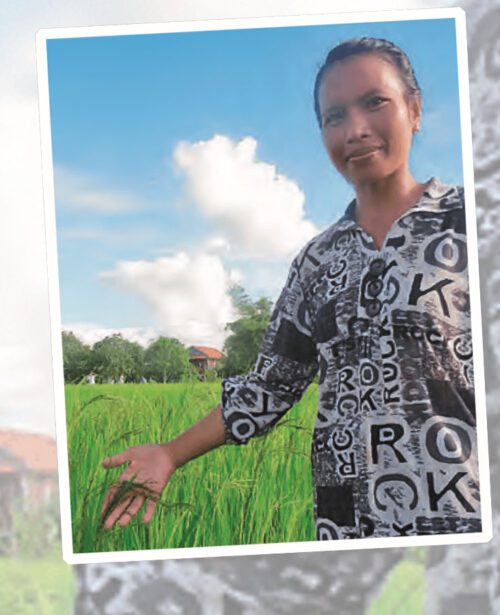Nhem Sovanry
Po Preah Sang village, Taphem commune, Tramkak district, Takeo province, Cambodia
Nhem Sovanry, 38, has 1.5 hectares of rice fields and 800 square meters of home garden. Ever since she was a child helping her parents in the farm, they had been using pesticides on vegetables they were growing like watermelon, cucumber and beans.
Things changed when she was introduced to PANAP’s partner CEDAC through a training on organic farming. After the training, she realised that organic farming will help the environment and make their lives healthier. “At first, it was difficult to take care of the crops and collect the fertilisers. But the value of the vegetables has grown and the selling price has increased,” she said happily.
She started SRI (System of Rice Intensification) in 2004, in a field trial, and then applied the full SRI technique in 2011. She now has a Rice Group with 21 members, mostly women, that also started in 2011. “Women are more active in the rice fields,” Sovanry said.
Her persistence is paying off. In 2013, out of more than 700 applicants in the district, she was awarded first prize in the SRI national competition organised by CEDAC.
Right now, what is most challenging in rice farming is access to water. So Sovanry is investing in a man-made pond. The construction of the pond is ongoing.
At first, her group did not believe in the potential of marketing their organic products. But when Sovanry visited the CEDAC market, she herself was convinced, and thus was able to convince the other women too. Now, they sell their produce to the CEDAC market on a monthly basis. They are scheduled to open their own weekly organic market in front of the local District Hall.
Sovanry conducts various trainings: SRI techniques, home gardening, chicken-raising; basic accounting and family budgeting, composting, how to make botanical insecticides, and post-processing. She goes to the farm of members to check on problems and gives advice. Her house is also used for delivering vegetables from the fields to the market. “I have to set an example to others. I have to give time for consultations and listen to them,” she said.
When she is busy with trainings, she delegates household and farm work to her husband and children. For her, trainings are very important. “When members cannot attend, I go to them one by one and explain to them why they should,” she said.
Sovanry is very happy when farmers practice what they have learned, and see how it contributes to their own livelihoods. “If farmers in Cambodia practice organic farming, families will be self-sufficient just like us. Farmers should understand the basic principles in farming: one has to have a pond (or water source), paddy field, home garden, and animals such as chickens or cows. With these four elements, including hard work, one can be a successful and self-sufficient farmer,” she said.


